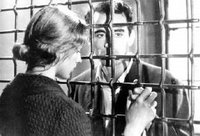 1968, Senegal/France, directed by Ousmane Sembène
1968, Senegal/France, directed by Ousmane SembèneThe first full-length feature from the great Senegalese director Ousmane Sembène, Mandabi gives free rein to his strain of humanism, and his eye for the details of the everyday. While his more recent films - Faat Kiné and Moolaadé - are explicitly about the status of women in Africa, that concern is also clearly in evidence here, and Sembène is quick to credit women with providing the backbone of family - and by extension community - life. The core of this film, though, is a satire on bureaucracy, greed and corruption, a biting indictment of Senegal's post-independence direction (his political commentary was even sharper in 1974's Xala), told through the experiences of a middle-aged man who receives a bank draft from a nephew in Paris. His attempts to cash the draft bring him into the contact with the worst of Senegal's bureaucracy, and not a few thieves; while the lead character is often spiky and sometimes foolish, his inherent decency in the face of continued opportunism gives him a quiet dignity, a value in short supply. Sembène doesn't hector us, though - at elast not until the very end - reminding us, subtly but insistently, that even the opportunists need to make a crust in a society always teetering on the verge of disaster.












